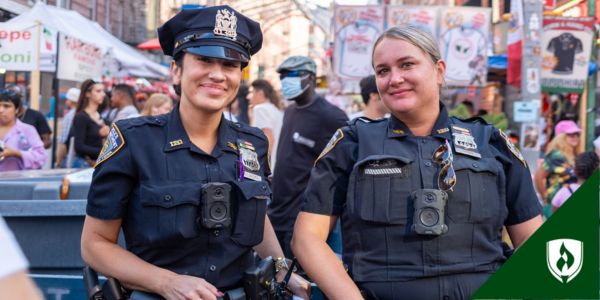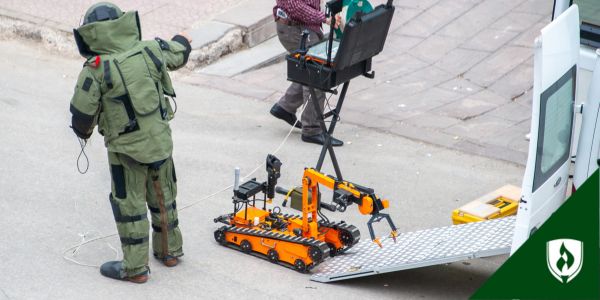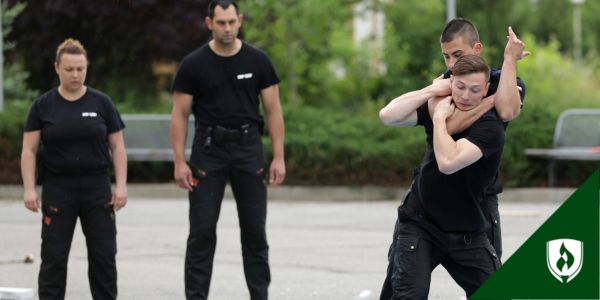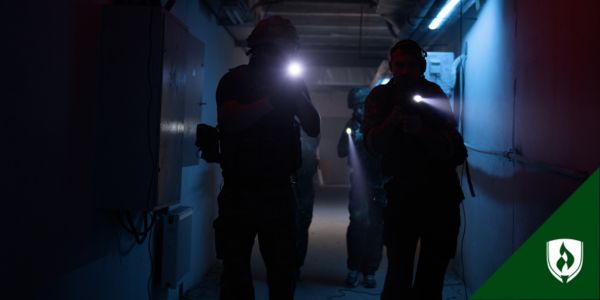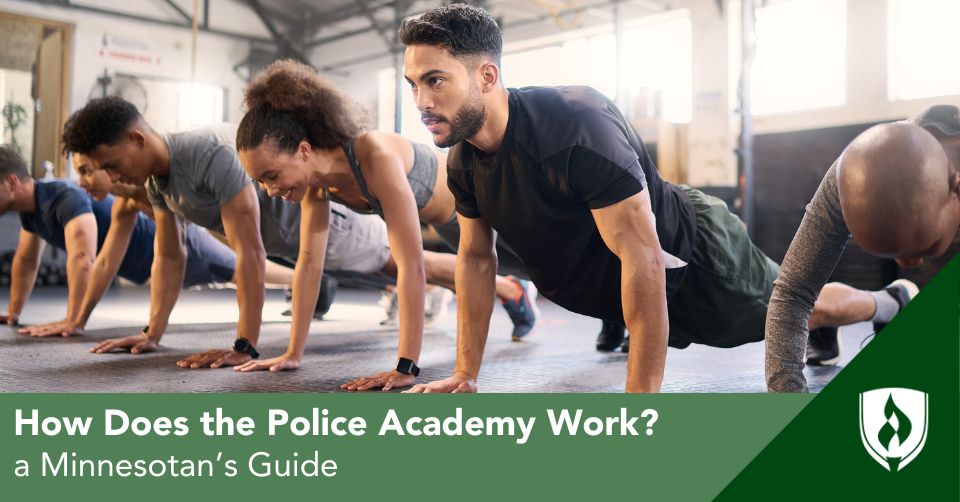
Making sense of the education and training you need to become a police officer can feel like a full-time job. And most of us don't have that kind of time.
Between work and family responsibilities, it's hard enough to consider a whole new career without running into all the confusing information about police academies and state-by-state differences in police training and requirements.
Some of that is unavoidable. The police academy process is different depending on where you want to work as a police officer. But we can clear things up a bit.
One helpful clarification—Minnesotans use the term "skills" instead of "police academy” when they refer to the physical training law enforcement students need before they can even apply for a Peace Officer licensing exam.
"It's been 'skills' since the 70s," says Bentley Jackson, Law Enforcement program coordinator at Rasmussen University. Skills encompasses the physical training, firearms training, emergency vehicle operations, situational decision-making and more that other places consider police academy training.
But depending on the police department you ultimately work for, you might also have new hire training called "police academy" or "training academy."
An overview of the police education process
A bird's eye view of the police training process in Minnesota usually looks like this.
- Earn a college degree and/or Enroll in a Professional Peace Officer Education program1
- Complete the skills academy training as part of that program
- Pass the Minnesota Peace Officer Licensing exam
- Seek employment by a police department
- Go through the department's police academy (or field training depending on where you're employed).
"There are several avenues of approach when you come into law enforcement," Jackson says. "The first question to address is if you already have a degree or not."
There are police officers with degrees in biology and officers who trained to become airline pilots before this career, Jackson says. But whatever your prior experience, you need some education specific to law enforcement if you want to get into the field. Basic training programs for law enforcement will include foundational knowledge about laws, court decisions and ethical considerations in policing.
"When you have that foundational knowledge, you come in for skills," Jackson says. "At the end of skills, you can take the MN POST licensing exam. After you pass the exam, you can be hired by a department—and then some departments will put you through their area-specific academy."
1. You must have at least an Associate's degree
Before you can take the skills academy, you have to earn a college degree.
"The rules for each state are different," Jackson says. "Some states don’t require any education at all. You can hold a high school diploma, get hired, then go through their training academy." But Minnesota requires an Associate's degree for Peace officers.
If you already have a degree in a subject unrelated to justice studies, your path might look different starting here. If you don't have a degree yet, enrolling in a law enforcement Associate’s degree program is a good first step.
Police officers need a deep understanding of criminal law, policing procedure and critical awareness areas (navigating cultural differences and mental health crises for example) as well as skills in communication, report writing and more. These academic parts of your training will be critical on the licensing exam as well as your success in law enforcement.
There are requirements you need to meet to enroll in a board-certified Professional Peace Officer Education (PPOE) Program. These requirements include a psychological evaluation, a physical fitness test and passing a criminal history screening.
Rasmussen University’s Law Enforcement Academic Certificate and Law Enforcement Associate’s degree programs meet the educational standards established by the Minnesota Peace Officer Standards and Training Board (MN POST) for persons who seek employment in Minnesota as a peace officer. Graduates of these programs may need to successfully complete additional academic coursework, training, practical/skills and fitness standards before becoming eligible to sit for the MN Peace Officer Licensing Exam.
The Law Enforcement Academic Certificate and Law Enforcement Associate’s degree program are not aligned to the standards of any professional licensing body other than the MN POST and are not intended to satisfy professional licensure requirements of any professional licensing agency in any other state. As licensure eligibility requirements vary among federal, state, and local law enforcement agencies, it is important to check the specific requirements of any agency at which employment may be sought.
2. You will need to complete a skills academy
There are two different aspects of police training that people might mean when they say "academy," in law enforcement, according to Jackson. The first aspect is skills—the training you go through to ensure you have the physical training police officers need.
Skills will include fitness training, defensive tactics, firearms instruction, emergency vehicle operations and more. For more about this, check out How to Prepare for the Police Academy in Minnesota: 11 Ways to Get Ready.
At this point, law enforcement students also start to really experience what they've been preparing for. "Students really bond," Jackson says. "It's amazing to see them on the first day of skills, everyone is so quiet—then by the end of it, there's so much camaraderie."
Rasmussen's skills academy happens at a state-of-the art facility, called the HERO training center on the Eagan campus. It includes shooting simulators, mats rooms, a 12-lane shooting range and moveable walls that create real-life scenarios for tactical training.
Check out this video of the law enforcement training facility if you want to see more!
"We provide a different option than many schools. We have evening and Saturday skills programs," Jackson says, adding that most of Rasmussen's law enforcement students are also working full time jobs while they train.
3. You must pass the Minnesota Peace Officer Licensing Exam
"After the skills academy, our law enforcement students are studying for their licensing test," Jackson says. "We have over a 90% pass rate on first time test takers."
After this, the state of Minnesota considers you eligible to be licensed, according to Jackson. "At that point, you can be hired by municipal police departments. You will remain eligible for a peace officer license for three years."
If you want more detail on licensing and how it works, check out How to Prepare for the Law Enforcement Licensing Exam in Minnesota.
4. After you are hired, you might attend another training academy
"Some agencies in our state have a training for new hires called an 'academy,'" Jackson says. "For example, the Saint Paul academy teaches the Saint Paul way."
Once you are hired, Jackson explains that departments will expect their recruits to already know how to handle firearms, how to handcuff, understand the laws, etc...but they will add training specific to their locality.
This time, however, you will be employed by a police department. If you've been wondering about the police academy cost, the good news is that police recruits, once hired, actually get paid for their training. The expense of your education to become a police officer is primarily in the initial law enforcement program you choose.
Jackson has also seen arrangements where police departments will offer some tuition reimbursement to attract new police officers. "There's just such a need right now," he says.
It's important to note that the vast majority of police departments will not have an entire academy for their new hires, according to Jackson. "Most police departments will have field training where you'll work in the field with a supervising officer. That's much more common than a local academy."
Why choose law enforcement?
"What I hear most often from law enforcement students is that they don't want to work an office job. They want to give back to their community," Jackson says. A career as a police officer is a good choice for people who want to be out and about, interacting with the people in their area.
"With police work, you will never have the same day twice," Jackson explains. "Many of our students had a career that just wasn't fulfilling to them. They've thought about law enforcement before, but other things came first."
And on the other end of the spectrum, Jackson says there are also plenty of younger people who are choosing law enforcement as their first career.
"They want to be the change. Altruistic motives are usually at the heart of this career." Jackson says he loves to see the increasing diversity in their officers and the way students are treating the role as a calling.
"It can be a taxing job, but it can also be a very rewarding job."
If that sounds like it might be for you, get the details about tuition costs, timing and more at Rasmussen's Law Enforcement degree page.
Rasmussen University’s Law Enforcement Certificate and Law Enforcement Associate’s degree program are not aligned to the standards of any professional licensing body other than the MN POST and is not intended to satisfy professional licensure requirements of any professional licensing agency in any other state. Graduates of Rasmussen University’s Law Enforcement Associate’s degree program and Law Enforcement Certificate may need to complete additional requirements before becoming eligible to sit for the MN Peace Officer Licensing Exam. As requirements may vary among federal, state, and local law enforcement agencies, it is important to consult the specific requirements of any agency at which employment may be sought.
1 Minimum Selection Standards STANDARDS FOR PEACE OFFICER ELIGIBILITY, Minnesota Board of Peace Officer Standards and Training, [accessed 6/27/2024] https://mn.gov/post/applicants/minimumselectionstandards/

